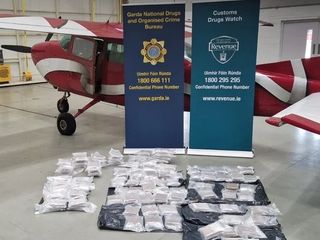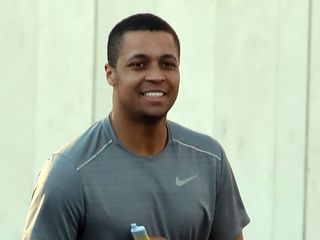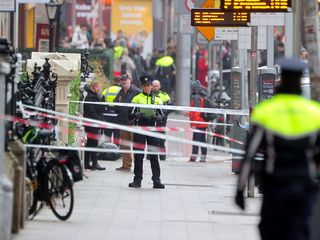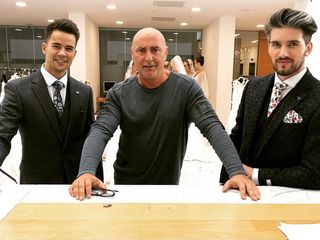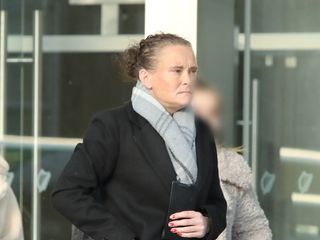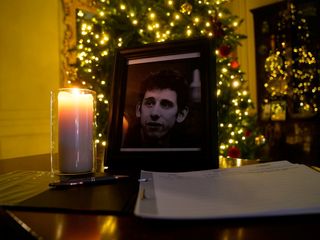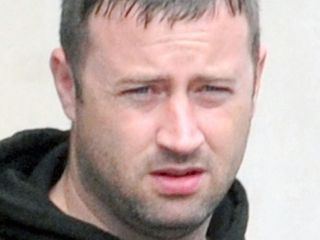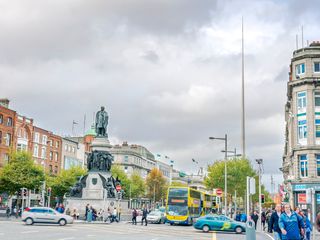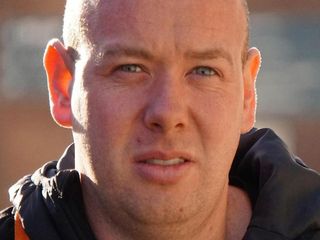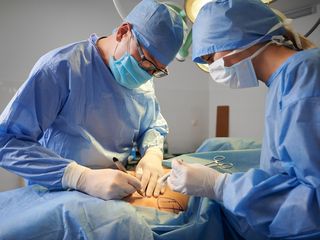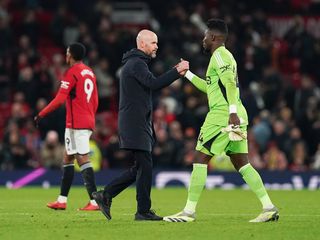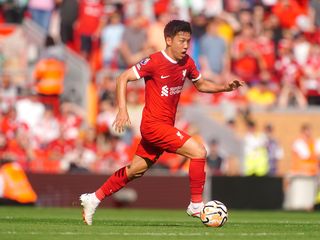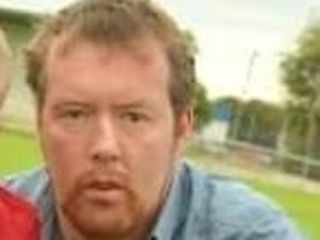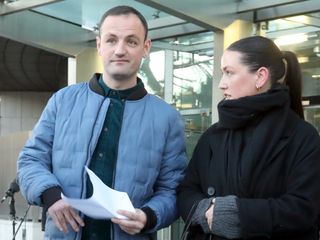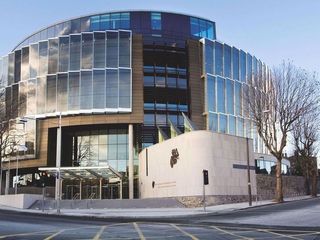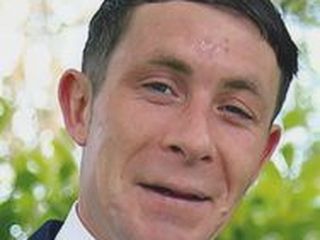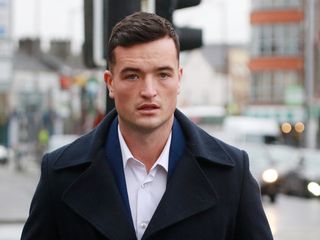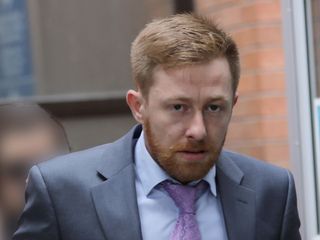- Home >
- Crime >
- Irish Crime
Nicola Tallant on the bloody rise and fall of 'Fat' Freddie Thompson -Long Read
From cocky street fighter to ruthless cartel killer, we chart the rise and fall of 'Fat' Freddie Thompson and reveal his battle behind bars
For those who knew him, it was obvious from a young age that Freddie Thompson was intent on making his mark on this world — and it was never going to be pretty.
Born on December 16, 1980 into a working class family of street traders in Maryland in Dublin’s south inner city, Thompson was a child who learned at an early age how to use his fists to get what he wanted.
In a neat and tidy Corporation home on Loreto Road in Maryland, he grew up with brother Richie and sisters Melanie and Lisa Jane.
His mother, Christine, struggled to bring her brood up alone after their father left when Thompson was only young, leaving the brothers to become the men of the house. Christine Roe came from a tough inner city Dublin family.
Her sister, Sadie, had married the notorious James ‘Jaws’ Byrne and together they had three daughters; Melanie, Maria and Joanne, along with three sons, James, Liam and David. The sisters spent a lot of their time together smoking and drinking cups of tea while the children played.
When he was still a child Thompson gained a reputation as a bully who would push and shove others out of his way to get what he wanted.
He was a nifty street fighter and was never afraid to use his fists to settle an argument.
Those who knew her, knew that Christine would always give her violent son the backing he needed to make sure that he was celebrated and not chastised for his behaviour.
Thompson was streetwise and sold newspapers on the corner of Clanbrassil Street as a child. But he also learned to steal and pilfer in order to bring home the bacon to his mother.
As he grew up he became more involved in petty crime and anti-social behaviour, and his fearless nature and aggression made him stand out early to gardai patrolling the notorious south inner city beat.
Many would have put money on the fact that Thompson was going to become a big player down the road. While Christine was a true Dublin 8 street trader, content at the stalls of Meath Street and Grafton Street, her sister Sadie had higher ambitions.
When she married the forger and fraudster ‘Jaws’ Byrne she vowed that they would elevate themselves from the grinding poverty which had coloured their own childhoods in Dublin.
Sadie loved a fur coat and gold jewellery – that would set her above her contemporaries in the flats.
And she knew that she was never going to have it all from the honest profits of a flower stall. If she wanted to get rich she would have to rely on ‘Jaws’ and his plotting and scheming to make a quick buck.
As a young teen, Thompson was excelling at his local boxing club, where he was deemed a quick and powerful fighter who stood out as a fearless opponent, never afraid to hurt or injure anyone he was pitted against.
Read more
He had stopped growing by the time he was around 13 and at 5ft 8ins he was hardly an impressive height, but he made up for his lack of stature with his ability to give savage beatings for little or no reason and in particular for any perceived slight.
With the Byrnes living in Crumlin and attending school there, a new circle of friends were opened up to him outside his Dublin 8 area.
Crumlin itself was a hotbed of crime and in the early 1990s to an impressionable and ambitious teenager, it was an exciting place of endless opportunities.
Around the young guns were countless veterans who had earned a good living from crime and many who had become rich and famous on their own reputations and ability to out-smart the police.
Thompson was hooked on the whiff of sulphur that hung in the air and he idolised the likes of Martin ‘The General’ Cahill, Martin ‘The Viper’ Foley and Larry Dunne and his family, who had become the first drug lords on the Dublin scene.
By the time he and his pals were old enough to become players themselves there was only one game in town – and that was to deal drugs and take a part of the massive profits to be made.
By 1994, when Cahill was murdered in nearby Ranelagh, 14-year-old Thompson was on the fringes of a large, young and rapidly forming drug gang who were about to make their own names in the books of gangland crime. Notorious criminal John Gilligan had certainly spotted their talents and was happy to use them to peddle his wares in the lucrative Crumlin and Drimnagh areas.
Gilligan was importing cannabis as a wholesaler and needed reliable salesmen. Two of Thompson’s superiors in the gang, Brian Rattigan and Declan Gavin, were perfect in his eyes.
The pair had become heavily involved in his supply chain while they were still only 15 and 16. In fact, on regular trips to Amsterdam and Spain, they had even been trusted to meet some of the suppliers that Gilligan used.
The youngsters were easily impressed by Gilligan’s success. By 1996, when he ordered the murder of Veronica Guerin, his drug business was worth a conservative €20 million a year – and he was living it up on holidays in Barbados and with a huge country pile in Kildare complete with his own private equestrian centre.
But the murder of the journalist would cause the equivalent of a tsunami in the delicately balanced underworld.
A massive political reaction to the daylight killing on the Naas Road, coupled with a major garda offensive on Gilligan and his gang, shut down the drug lord’s operation almost overnight, leaving a huge vacuum to be filled by anyone in the right place and at the right time.
Rattigan and Gavin were hungry for success and they instantly saw their opportunity and took it with both hands. The pair were still only teenagers but they had the skills and the contacts to fill the void left by Gilligan. Everyone moved up a notch – Thompson too.
With his elevated status came new opportunities and soon Thompson was turning hundreds of euro into thousands and had a girl called Vicky Dempsey on his arm.
His ruthless approach to business, coupled with his boxing skills and connections, made him a feared figure in an already tough underworld.
Read more
By the time he was 19 he was moving from dealer to distributor and had transitioned from selling drugs in flat complexes like Fatima Mansions to being the supplier to younger teens working the landings where addicts and prostitutes queued up for his wares.
Nobody got ‘tick’ and to remind the customers to pay up he often beat or stabbed them.
Thompson idolised Declan Gavin but never got on so well with Brian Rattigan and when the pair fell out he backed Gavin and brought his pal Paddy Doyle in as muscle.
Tit-for-tat rivalries started but when €1.7 million of cocaine and ecstasy was nabbed at the Holiday Inn Hotel in a garda raid things changed for good.
One trait shared by those involved in gangland is an insatiable greed for money. There is simply never enough. For Brian Rattigan and Declan Gavin, it was that greed that had been the glue that had held their one-time friendship together.
While they absolutely hated one another, they both still knew that they could make more money if they pooled their resources to buy supplies, and up until the Holiday Inn bust that trumped all else.
But when gardai burst in to the two adjoining hotel rooms – 24 hours into the preparation of the cocaine consignment – everything changed.
Graham ‘The Wig’ Whelan and his pal Phillip Griffiths were literally caught red-handed with the drugs, but Gavin was having a lie down and wasn’t physically touching any of the gear when the raid took place – meaning he had to be released after questioning.
While many may see that as a stroke of luck, in the paranoid drugs underworld there are no co-incidences and good fortune only exists for those who make their own.
Rattigan immediately pointed the finger at his business partner, accusing him of being a garda informant.
Gavin levelled the same accusations at Rattigan. In the days and weeks that followed, the gang drew battle lines and clearly divided forever more. Firmly by Gavin’s side was Thompson, his friend Paddy Doyle and money man Darren Geoghegan.
In August 2001, a heady mix of cocaine, alcohol and that underlying hatred would bring the tense situation to a whole new level. Then, the Rattigan clan gathered to celebrate the 18th birthday of Brian’s younger brother Joey. On the same night, Declan Gavin had gone into town and had a big evening out in Temple Bar.
Always popular with the ladies, he had taken enough cocaine to keep him up all night and by the time he took a taxi back to Crumlin, a local Abrakebabra takeaway was the only place where there was a bit of life.
Guests at the Rattigan party had made their way to the restaurant too, to bring supplies back to the guests still partying hard on lines of cocaine and bottles of vodka at the birthday bash. They spotted Gavin.
Brian Rattigan was red eyed and sniffing frantically when he got out of the screeching Nissan Micra that had transported him from the party at Cooley Road to Abrakebabra.
He lifted his balaclava and showed Gavin the large knife he had brought with him. “Do you remember me?” he asked, before he launched himself at Gavin with the knife.
It would be the first killing of 16 and in a matter of hours Freddie Thompson had stepped forward and become the new boss, promising to stop at nothing until Rattigan was six foot under.
Read more
Just six months later, a paranoid Rattigan knew he had to strike again before he was hit himself, and when he heard that Freddie and a number of gang members were drinking in a city pub he drove past and let off a few shots. Later that night Thompson made his move.
Rattigan was asleep in a downstairs room with his girlfriend Natasha McEnroe when Thompson and his cohort burst into the house. McEnroe tried to wake Rattigan but he had taken so much drugs and drink that she couldn’t. In terror, she slipped into an en-suite bathroom and watched as gunmen pumped five bullets into him.
Amazingly, Rattigan survived, and during the seven rounds of interviews that followed his arrest for the shooting, Thompson repeated to gardai: “Nothing to say at this time.”
With Rattigan seriously injured, Thompson moved in. He first ordered the murder of a young man accused of making a call to the Rattigan home on the night of Gavin’s murder.
He survived the shooting but refused to make a complaint. In July 2002, Thompson was salivating at the thought of revenge and turned his sights on Rattigan’s little brother Joey.
This new style of warfare marked a change in gangland that would continue throughout the Crumlin and Drimnagh feud and follow on to the Hutch-Kinahan war.
It would even be a sentiment echoed years later by cartel lieutenant James Mulvey, when he was recorded telling a girlfriend while on the run: “They go after the ones you love. They kill the ones you love.”
Joey was at home with his girlfriend when he got the call from Paul Warren inviting him to go down to a pub in Dublin 8 for a pint.
It was a good night and at 2am as he headed for home he was shot in the head by a waiting gunman. He died instantly.
Rattigan was apoplectic after his brother died. This was an eye-for-an-eye and a brother for a brother– but he was sent to jail when he was caught with €27k worth of heroin and was also facing the Gavin murder charge and destined to be locked up for a long time.
Warren was quickly identified by gardai as working with Thompson and his chief enforcer, Paddy Doyle, as the gun for hire.
Behind bars in early 2004, Rattigan hired a killer called Gary Bryan who assassinated Paul Warren, infuriating Thompson. Within days, an innocent man was beaten by mistake and gardai told Richie Rattigan – Brian’s older brother – that there was a bounty on his head.
By December 2004, Thompson’s mother’s house on Loreto Road was shot up. Christine Thompson was asleep at the time but was uninjured and when Freddie was released from jail a few days later, before Christmas, he attempted to kidnap Rattigan man Joey Redmond but failed.
He would celebrate the festive season but as soon as it was over, he vowed, it was down to business.
By early 2005, Thompson was a walking murder machine and all over the city people were terrified of his capabilities.
Tensions were so high that Thompson and his close inner circle were moving from place to place, rarely staying in the same location for two nights in a row.
But still, the murders came. Rattigan’s lieutenant John Roche was next – in March 2005 he was killed in retaliation for Paul Warren. Thompson is said to have watched the murder and cheered and celebrated after his death.
Read more
A month after Roche was killed, drug dealer Terry Dunleavy was shot in Ballybough.
It quickly emerged he had owed Thompson a small debt and Paddy Doyle had gone to see him for the money.
By the summer, a sick relative of Rattigan had his home shot up and an attack on two Thompson loyalists followed – leaving one paralysed.
Days later gardai searched a house in Portarlington in Co Laois and uncovered a chilling list written by hitman-for-hire Alan Wilson, who they believe had been working for Thompson along with other feuding mob bosses
The list included criminal associates as well as relatives of Brian Rattigan. Beside the names of his sister Sharon, partner Natasha McEnroe and the sick relative, whose house had already been shot up, was scribbled ‘easy got.’
In November, Thompson’s money man Darren Geoghegan and his assistant Gavin Byrne drove to Firhouse for a pre-arranged meeting with someone. Geoghegan had set up an intricate network of investments and property purchases to wash the massive amounts of money the gang was making.
They were both shot dead.
Initially, gardai who were called to the scene of the barbaric double shooting believed the murders had to be the handiwork of Rattigan – but soon investigations suggested that Paddy Doyle had killed both on the orders of Thompson, although it has never been properly established why he decided to kill his own friends in the middle of the feud.
Geoghegan and Byrne were the seventeenth and eighteenth gangland murder victims in 2005 alone.
Two days later, Noel Roche became the nineteenth – and the eighth victim of the Crumlin and Drimnagh feud – when he was shot dead in Clontarf after a Phil Collins concert.
His brother John was dead less than eight months and his killing meant that Rattigan had lost yet another of his soldiers.
Thompson’s enforcer Doyle became gangland’s most wanted man and spent weeks travelling around in disguise. Just like his boss, he would often dress as a woman and wear wigs to change his look, but a month after the three shootings he left Ireland for good, travelling first to Birmingham and then on to Spain for a new life.
In 2006 Wayne Zambra, one of the youngest and most trusted members of Rattigan’s gang was shot dead, but it quickly emerged that he was killed on the orders of his own after he was caught dipping into funds.
Drug addict Gary Bryan was understood to be the shooter. Fresh out of prison, he had been hired by Rattigan but Thompson, ever the strategist, had him shot dead before he could strike again.
A week later, in October 2006, Thompson was arrested in Rotterdam with machine guns and 7kgs of cocaine.
He was facing three years and the gardai were hopeful he would get the maximum sentence – but he had luck on his side and the Dutch magistrate threw the case out, ordering authorities to compensate him for each day he had spent in prison in Holland.
Back home Thompson made an alliance with the McCarthy-Dundon gang in Limerick and continued his trigger happy justice.
Rattigan cohort Wayne McNally was shot but survived, and then Thompson forced a terrified petty criminal to shoot his friend, Ian Kenny – who died two years later when his family turned off his life support.
Rattigan’s side was seriously weakened by all the losses but just when Thompson thought he was home and dry he found himself on the wrong side of Declan ‘Whacker’ Duffy, just released from prison after serving his time for his role in the Ballymun Bloodbath. Duffy wanted money but Thompson told the INLA thug to “f**k off” before high-tailing it to Spain for cover.
Thompson liked Spain and had regularly used the Costa for downtime if he had to lie low.
He loved the sunshine, the lifestyle and the feeling of being with the real gangsters of Europe, where he hoped to make his final elevation in the drugs world.
At that point, Spain was the HQ of Dubliner Christy Kinahan Snr’s operation and while the ‘Dapper Don’ was totally out of reach for the likes of Thompson, his sons Daniel and Christopher Jnr were not and mixed with plenty of his associates from home, including Gary Hutch.
Doyle had got himself a luxury apartment in Cancelada in a gated community close to the golf course and Freddie moved in. Hutch was living in the nearby Vista Golf and Thompson’s cousins David and Liam Byrne were regular visitors.
The group often hung out with the Kinahan brothers.
Their days would start in a gym, followed by a working lunch and the evenings were regularly spent in Peter ‘Fatso’ Mitchell’s pub and club Paparazzi.
For his part, Thompson was desperate to be accepted and in 2008 he carried out the unthinkable to prove his loyalty. Thompson was Paddy Doyle’s closest friend but when a plan was put in place to kill him Thompson and Hutch were there to make sure it was carried out.
After the murder he returned to Dublin but quickly went back to Spain when he realised there was a number of different bounties on his head.
Rattigan, despite being locked up, had continued to operate his own drug business with the help of an endless supply of mobile phones in prison and had a new enforcer, Anthony Cannon, at his beck and call.
Along with another associate, Gerard Eglington, the pair were collecting drug money and doing Rattigan’s bidding. Intent on shutting him down again, Thompson returned, clocking up his next victim when Shay O’Byrne, the partner of Brian Rattigan’s sister Sharon, was killed. By July, Cannon was shot twice in the head.
He was the last remaining hard man that Rattigan had on the outside. By December 2009, as Thompson continued his purge of his old enemies, Rattigan was jailed for life for the murder of Declan Gavin.
The mandatory sentence was a finality of sorts in the decade-long feud, and Thompson was happy he could set his sights on the true prize – a place at the top table in Spain.
There, a cocky confidence had grown in Daniel Kinahan, who vowed his operation would be bigger and better than his father’s when he finally got his chance to take the reigns of the operation.
Thompson didn’t go unrewarded for facilitating the murder of his one time best friend. On the contrary, both he and Gary Hutch got a big promotion from Kinahan as the ‘Dapper Don’ planned his retirement.
Within a year of Doyle’s murder, Hutch and Thompson were travelling between Portugal, Africa and the Netherlands, frequently hammering out drugs and weapons deals for the cartel.
Later, a Spanish police report would describe the pair as Daniel Kinahan’s ‘trusted right-hand men who were carrying out jobs directly related to the organisation’s criminal activities’.
Thompson, the document would reveal, was also the man who ordered weapons for the cartel and acted as a bodyguard and chauffeur for Daniel.
By 2010 business was booming and Thompson was where he always believed he should be – at the very top level of organised crime in Europe. As far as he was concerned, his war in Dublin was worth every life and every drop of blood.
In May 2010, Thompson and Hutch packed up their designer suitcases and headed for Malaga airport for a business trip to Amsterdam.
They were going to cut a deal to bring a large shipment of drugs into Europe. Just two days later, the pair were awoken to news of a major cross border offensive on the Kinahan organisation.
A total of 22 arrests were made in Spain under Operation Shovel and for the next year some of the top command fought for bail while Thompson stayed on the move between Birmingham, Amsterdam, Dublin and Marbella.
Gardai believe he travelled on false passports and wore disguises in case he would be recognised at airports.
Thompson’s absence from the streets of Dublin gave new gusto to what was left of Rattigan’s men and they made repeated attempts to gain ground and to get at his family.
In March 2011, Freddie’s brother Richie and his partner Catherine were attacked in a Dublin pub by a gang of Rattigan’s men. Richie was glassed in the face while Catherine suffered a broken leg.
Two months later, a viable pipe bomb was thrown at the back of Christine Thompson’s house and in August there was a second attack on the property.
An angry Thompson returned to Dublin swearing vengeance and sending the city back into high alert. Surrounded by young associates, he received visitors at his mother’s home and publicly stood in the front garden to let everyone know what he would do to protect his territory.
His return was short lived, however, and within a month he was arrested at the request of the Spanish. The European Arrest Warrant cited that Thompson was believed to be a member of an international criminal gang involved in the trafficking of drugs and weapons.
Back in Spain, the mob lawyers had got the Kinahan top command out of prison and quickly the heir to the throne, Daniel Kinahan, got to work on his master plan to pocket millions from drugs, then re-emerge as the world’s biggest boxing promoter.
In 2012 MGM – Macklin Gym Marbella – opened its doors. Nearby pubs, cafés, restaurants and clubs were snapped up.
Thompson remained on the move, flying from Spain into Holland and between the UK and Ireland sealing deals for major drug and weapons shipments. In September, he found time to organise the murder of Gerard Eglington, who was shot dead at his home in Co Laois in front of his children. But it still wasn’t enough.
During Christmas 2012 Christopher ‘Git’ Warren was murdered in Dublin after a row with a female associate of Thompson.
During the funeral, Thompson made it his business to be at Morrissey’s Pub in Cork Street where funeral-goers gathered for drinks afterwards.
After he had made his presence felt, he headed back to Amsterdam and there in 2014 his luck finally ran out when he was arrested and returned to Ireland on a warrant.
With Thompson behind bars, curious events which would lead to the Regency Hotel killing and the ultimate demise of the cartel would begin.
Things started going drastically wrong within the Kinahan mob at the same time that a major figure in the Dutch underworld, Samir Bouyakhrichan, nicknamed Scarface, was shot dead in Benahavis.
His murder would ultimately pave the way for Daniel Kinahan to form a European supercartel with mob partners from the Netherlands, Italy and the Balkans.
The first indications back home of in-fighting emerged at the funeral of Kinhan’s mother Jean Boylan when graffiti accusing Gary Hutch of being a ‘rat’ was scrawled on walls in Dublin.
Next, Jamie Moore, an innocent boxing coach, was shot on the grounds of Kinahan’s Estepona mansion and Hutch was immediately blamed. By February 2015, as Thompson received a 20 month sentence for violent disorder, relations between Hutch and Daniel Kinahan had become so toxic that a murder was being planned.
Weeks later Gerard ‘Hatchet’ Kavanagh was murdered at Harmon’s Bar in Marbella. Daniel Kinahan told whoever would listen that a foreign drugs gang displeased with his heavy-handed approach to debt demands had assassinated him. It would later emerge he was killed on the orders of the Kinahan mob.
A month later Paul Kavanagh – Hatchet’s brother – was shot dead in Dublin. By August, when Thompson walked out of prison, his sixth sense told him to lie low.
A month later his best pal Gary Hutch was murdered in Spain and the Hutch and Kinahan sides embarked on a path of destruction.
Just like the killing of Declan Gavin a decade previously, Thompson knew he needed to be on the strongest side and Daniel Kinahan was his obvious choice.
While he couldn’t quite trust him, he knew he had to keep him close and he hoped his blood ties to some of the cartel’s most important customers would be enough to keep him alive.
The February 2016 attempt on the life of Kinahan at the Regency Hotel which resulted in the murder of Thompson’s cousin David Byrne changed gangland for good – but it also brought with it a rare opportunity for Thompson to finally step forward into the public arena and stand shoulder to shoulder with the boss of the Irish mafia.
Outside St Nicholas of Myra Church in his native Liberties, Thompson finally felt he had won the seal of approval when as a chief mourner he flanked Daniel Kinahan and greeted visiting dignitaries from the world of organised crime.
Amid the stretched limos, the lavish floral tributes, the pipers, the horse drawn carriages, the motorcycle outriders, the rows of young men in blue shirts and black shades, Thompson took centre stage – thrilled to have been given the job to ferry around the Kinahan brothers.
Beside them, Thomas ‘Bomber’ Kavanagh stood tall in a pair of heavy black shades. Kavanagh, married to Joanne Byrne, had flown in from Birmingham and was being given all the respect of a family ‘Don’. After the funeral, Thompson awaited orders from the top and hoped the attack at the Regency meant that everyone had to band together and that loyalties were all that mattered. He knew Daniel Kinahan had to regain control of the city and he couldn’t show any weakness either. Like a loyal soldier, Thompson was ready, willing and experienced in such unpleasant matters.
But the call never came. Daniel Kinahan went elsewhere looking for help and Thompson stayed on the move, clad always in bullet-proof jackets and regularly in disguise. Often he moved in convoys, always bringing spotters with him as he went from place to place and he watched on as different hit teams were mobilised. The Hutch-Kinahan feud was insatiable – far worse than his own war with Brian Rattigan.
Six months into the feud and following five gruesome murders, one of which was a case of mistaken identity, the Kinahan side wanted to ‘up’ the body count and strike terror into the heart of Dublin. Thompson was ordered back to Dublin to identify targets. With a number of hits on his own head, the pressure was immense, accusations of touting was widespread and paranoia at the highest level imaginable.
The city seemed to be awash with offers of blood money and nobody knew who to trust. And it was amid that heady mix of paranoia and fear that gardai believed Thompson made a bad judgement which would end his reign.
Thompson was quick to identify an easy target. David ‘Daithi’ Douglas, a criminal who had a stint behind bars for cocaine supply, was sure he had sorted his differences with the Irish mafia. With a business in Dublin 8, he operated right in the heart of Thompson’s territory, but had been accused of being one of two men in a would-be hit team that had been spotted at the Red Cow Hotel the previous November when it was suspected a hit may have been planned on Kinahan for the first time.
Drug dealer Darren Kearns had already been shot dead after he was identified as being one of the mystery duo and Douglas had survived a gun attack.
But he had met with mob representatives in the aftermath and insisted that he’d had nothing to do with the would-be shooting, even providing an alibi for them.
Convinced he’d been believed, he’d returned to his ordinary life and was openly coming and going from his wife’s shop on Bridgefoot Street.
It was July 1, 2016 and around the same time that Douglas was shot dead a CCTV camera would pick up the image of Thompson taken at his family market stall at the Guild of the Little Flower on Meath Street. The footage showed him getting out of a Ford Fiesta, crossing the road to his family’s stall and then disassembling a mobile phone while handing the key of the car to the female running the stall.
Gardai knew that they had to have a rock solid case if they were to go for Thompson for his involvement in the Douglas murder.
While he wasn’t the shooter, they did believe that he had directed the operation and that he had travelled in convoy around the city circling the victim and waiting for the ideal moment to pounce.
In the months after the murder, gardai painstakingly pieced together CCTV from across the city, identifying the four-man hit team they believed to be responsible for the murder.
While officers knew they had potentially got a huge case against Thompson, few allowed themselves to dream that it would do anything but backfire as usual – that his stretch of good luck would continue.
In November 2016, Thompson was in the toilets of the City North Hotel in north county Dublin when cops pounced. He had just flown in from the UK to Belfast and had boarded a bus to Newry where he was picked up by two associates before being brought to the hotel.
“This feud won’t end,” he joked, ever putting on the carefree front. In custody, Thompson sat in front of the gardai drafted in to question him in relation to the murder and knew just what he was going to do.
Despite his love of notoriety and his reputation for quick wit, this was no time to shoot his mouth off. Thompson sat back and settled in for a long session ahead.
Sergeant Brian Hanley and Detective Garda Sean O’Brien knew Thompson from old and knew just what they were facing as they began the process at Kilmainham Garda Station. Asked if he understood that he had been arrested in connection with the murder of Douglas, Thompson answered the detectives: “No comment at this time.”
And so it continued for every question they put to him, including those to confirm his name and date of birth.
In custody, Thompson faced more humiliation regarding his status in the Kinahan cartel when he was forced to await sanction from Daniel Kinahan’s pal Davin Flynn in order to be allowed enter Mountjoy.
As he awaited trial he was moved around the prison system as part of an attempt to keep cartel players away from one another.
His murder trial began in May 2019 and the Special Criminal Court heard that both DNA and CCTV linked him to two vehicles used by a group of men working in concert to kill Douglas.
Opening the trial, Sean Gillane SC, said it was not the prosecution case that Thompson had shot Douglas but that he had directed the killing. “There was one hand on the gun but many fingers on the trigger. It is the prosecution case that one of those belonged to the accused,” he told the court.
Evidence given also heard that following the murder, Thompson met up with others for a knees-up at Little Caesars restaurant off Grafton Street.
The murder trial heard that Thompson was warned during his arrest that the court could draw inferences from his failure to give an account for being in alleged ‘spotter’ cars and to account for his DNA and fingerprints. But still he answered: “No comment at this time.”
Throughout the trial, Thompson eyeballed those in the body of the courtroom and chatted freely with his mother Christine, who heard almost every day of evidence.
But his confident demeanour began to slip as he presented his defence – concentrated on the garda failings in their investigation more than anything else and ironically suggesting he had a reason to act suspiciously as he was a major gangland figure. As the case closed the three judges retired to consider their verdict.
It was a long wait for the July 24 ruling over one of the hottest summers in decades, but Thompson arrived into the court with the strutting confidence and smug smirk that many had become accustomed to during the course of his trial.
Chatting to his mother and sister in the body of the courtroom, he seemed upbeat and cheerful as he awaited the arrival of Justice Hunt and his colleagues Judge Flann Brennan and Judge Gerard Griffin who would decide his fate.
The Special Criminal Court is different to the ordinary criminal courts as no jury is present but the same tense atmosphere exists on judgement day as it does when 12 men and women retire to consider the future of an accused. In the case of Thompson few were willing to nail their colours on which way the hammer would fall – more from a sense of unease than anything else.
Wearing a white shirt, navy tie, navy trousers and blue and white runners, Thompson thumbed through a red bible in the courtroom while Justice Tony Hunt began his lengthy recall of the evidence presented over the course of a number of weeks to the court.
During the trial the non-jury court had heard that Douglas was shot six times shortly after he took a meal break at the counter of his partner’s shop, Shoestown.
A semi-automatic pistol with its serial number removed was found next to his head.
Justice Hunt went through the evidence as realisation began to dawn on those in court that this could be the end of the road for Thompson. The judge said there was no doubt that Douglas was murdered and that it was an execution involving intricate advanced planning and co-ordination.
He pointed out that the prosecution did not suggest that Thompson was the person who fired the shots, but that he was one of the people involved.
Specifically, he said, Thompson had been driving a Ford Fiesta that was intricately involved in the murder plot.
The Fiesta was seen interacting with other vehicles and individuals involved in the plot on the morning before the shooting. It also drove past Shoestown four minutes before the shooting, in what Justice Hunt said was a “final check” before the gunman arrived to carry out the planned execution.
In the dock, Thompson often shook his head as he thumbed through his bible – likely just a prop for the media or an in-joke with a fellow lag that he could manipulate a headline.
But the outcome was beginning to look more and more bleak and the joke no longer seemed funny.
Justice Hunt said Thompson was caught on CCTV acting in a “furtive and suspicious” manner on nearby Meath Street around the time of the shooting.
He dismantled a mobile phone and was seen later that evening at a restaurant with two other men that the court said were involved in the murder plot.
The defence had argued that while Thompson’s activities were “suspicious”, the evidence relied on by the prosecution had fallen well short of proof of guilt beyond a reasonable doubt.
But Justice Hunt said that any innocent explanation of all these different strands of evidence would require “an excessive reliance on unlucky coincidence.”
Referring back to Thompson’s arrest when he had answered: “No comment at this time” to everything put to him at Kilmainham, Justice Hunt said the court had taken into account his failure to answer gardai when they questioned him about his movements on the day.
It seemed the proverbial chickens were finally coming home to roost. Justice Hunt said that the prosecution had largely relied on circumstantial evidence, and that each individual piece was not in itself enough to prove guilt.
However, taking all the pieces together, the court was satisfied that the prosecution had proven beyond a reasonable doubt that Thompson was guilty as charged.
In the end it was over very quickly and in one word – ‘guilty’ – came the end of Freddie Thompson’s bloody reign of fear and murder that had spanned two decades. Aged just 37 years of age he was given the mandatory life sentence.
Thompson had regularly shaken his head over the two-and-a-half hour deliberation and when the court’s decision was finally revealed, he took up his bible and stormed out the door leading to the cell area, followed by prison officers and a garda.
He returned less than an hour later without his bible, and wearing a less formal blue t-shirt and black shorts – a lame bid to show his contempt for the court.
Justice Hunt sympathised with Mr Douglas’s family, particularly his daughter who witnessed the shooting.
He said it was a terrible thing for anyone to see. He further commended the gardai involved in the case, saying that the standard of the investigation into his “execution” was “second to none”.
Michael O’Higgins SC, for Thompson, said he would be appealing the decision and outside court Detective Superintendent Paul Cleary said the family of Mr Douglas was satisfied with the verdict. He added that the investigation is ongoing.
Away from the cameras, detectives heaved a huge sigh of relief. Many had spent the majority of their careers chasing down Freddie Thompson.
But there was no doubt but his conviction raised questions as to why it took gardai so long to bring him to justice and what lessons could be learned from his career.
Thompson had gone from a street thug to a monster but all the while the State looked on watching his notoriety and celebrity grow. For the communities that lived under his brutal reign his end couldn’t have come sooner – and yet he seemed to return time and again like a cancer that couldn’t be eliminated.
Like all players in the dog-eat-dog world of organised crime, Thompson has been replaced on the streets of Dublin with a number of players lining up for his crown.
But behind bars he continues to aggravate and is constantly seeking ways to challenge the authorities of the prison service and, indeed, the State.
Only last year, he brought a High Court action on an alleged failure of the prison service to respond to questions about the conditions of his detention in Limerick Prison where he had been moved after an incident in Portlaoise jail.
Thompson claims that the way he was being held in the prison amounted to a ‘punishment’. In the action, he says that as soon as he arrived in Limerick he was confined to a padded cell without his clothing or personal items and was isolated from other inmates.
He says he wasn’t informed by the prison authorities why he was moved or if he was there as a disciplinary sanction, complaining that the authorities refused to answer questions by his solicitors.
Thompson had been kept at Portlaoise up until the move in October last year and has cited formal complaints he made about the conduct of prison officers in Portlaoise in the years before he was transferred. In 2019, he told the High Court, he made the complaints which he says were upheld in a report.
However, he also claims that neither he nor his solicitor were given a copy of the investigator’s report into his gripes. After he made the complaints Thompson claims he was mistreated at the hands of prison officers in Portlaoise and made more reports that he was deprived sleep at night due to banging on his cell door in April last year.
The convicted murderer, who has always tried to cite his rights throughout his dealings with the authorities, says he has been denied access to newspapers, that his dietary requirements have been ignored and that his cell is the subject of overly frequent searches by prison officers.
When he was moved to Limerick, he says, he was told he would be there for six weeks but wasn’t given a reason for the transfer. He claims it is a punishment but that he wasn’t the subject of any disciplinary hearing, nor provided with any paperwork informing him that a sanction has been imposed on him.
Arising out of this it has emerged Thompson has brought judicial review proceedings against the Governors of Limerick and Portlaoise Prisons, the Irish Prison Service and the Minster for Justice.
The prison services are well used to lags making complaints and trying to drag them through the courts for perceived offenses and breaches of their human rights. The judicial review is not the first time Thompson has brought a challenge over the conditions of his detention.
In 2019 he brought High Court proceedings against the prison authorities of what he claimed were oppressive conditions of his detention for 18 months in Portlaoise Prison’s A4 wing, which is known as the punishment block.
He was there, the court heard, because he was ‘troublesome’ and intimidated younger lags.
Both the prison authorities and the Minister for Justice opposed the action, saying his regime was due to ‘security concerns’ and the claim was withdrawn when Thompson was moved from the isolation block to the mainstream prison population.
Amazingly, during the three month challenge, which was estimated to have cost the taxpayer more than E100,000 in free legal aid, it was heard that the long running feud with Rattigan was over and that they no longer wished to harm each other.
Rattigan even filed an affidavit saying there was “no bad blood” between them any more but few believe that the old
rivalries have actually died away and that simply the pair share a deeper hatred for the authorities of the State than one another.
In an incredible twist of fate, Rattigan’s luck turned just around the same time that things went south for Thompson.
Although he had initially been handed down a life sentence for the murder of Gavin, the conviction was overturned in 2017. In October 2018 he pleaded guilty to manslaughter and was later jailed for nine years — a sentence which was backdated and led to his release last year from prison.
Despite fears of what his release would mean to the delicate balance of peace amid the gangs of Ireland, Rattigan has so far remained off the radar and although he was spotted outside his family home in Drimnagh last summer, rumours have persisted that he has moved to Spain.
While Rattigan has been in prison most of his adult life on sentences for serious drugs, firearms and assault as well as the original murder sentence, it seems for the moment he is enjoying the last laugh and his freedom.
Perhaps he is kicking back under the Spanish sun, and although he does insist he has changed his life around and intends to go clean, many have adopted a wait-and-see attitude to his reformation.
But what is for sure is that the tables have turned – Thompson now keeps busy bullying younger prisoners and thwarting the system that has incarcerated him, it is clear that when he backed Kinahan he put his money on the wrong horse.

